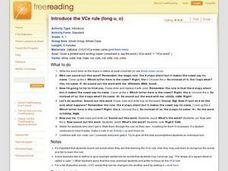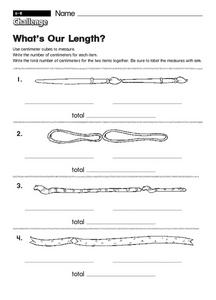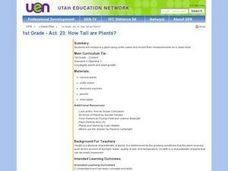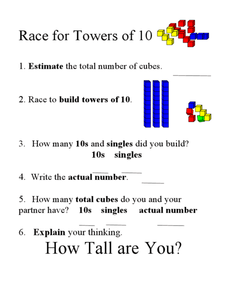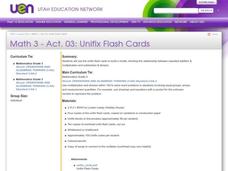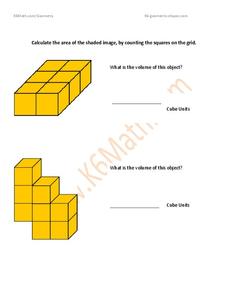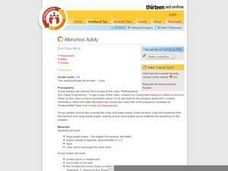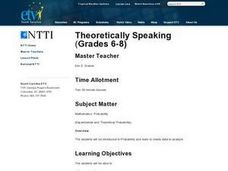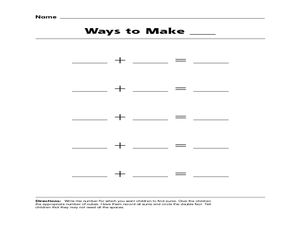Curated OER
Introduce the VCe rule (Long u, o)
Students say the word "dime" as the teacher writes it on the board and reviews the silent e/long vowel rule. In this phonics lesson, students say other words and review the rule as words are written on the board, first without the ending...
Curated OER
Science: How Tall Are Plants
First graders investigate plant growth and examine what factors contribute to plant growth. They keep a class chart of plant growth and write about and illustrate their conclusions.
Curated OER
What's Our Length
For this measuring length worksheet, students use centimeter cubes to measure the length for each illustrated picture. Students write the number of centimeters for each picture and add the centimeters for both items. Students write the...
Curated OER
How Tall are Plants?
First graders measure a plant using unifix cubes and record their measurements on a class chart.
Curated OER
Rolling Records
Fourth graders play a game to determine the likelihoods of different outcomes when rolling two number cubes. Students play a game to determine the likelihoods of different outcomes when rolling two number cubes.
Curated OER
Towers of 10
Students complete four worksheets of activities to use cubes to count by 10s. For this counting blocks lesson, students use blocks to count by 10s and complete block counting activities.
Curated OER
Unifix Flash Cards
Third graders are asked how multiplication, division, addition and subtraction are related. After being read part of a book, they work together to build a model between addition and multiplication. To end the lesson, they write about...
Curated OER
Groups of Ten Tens
In this place value worksheet, students read about counting by tens using rows of cubes. They circle groups of 10 rows and write how many hundreds they make.
Curated OER
The Challenge of Ice and Water
High schoolers work in teams to solve a variety of challenges involving water. They move an ice cube from one glass to another without touching the ice or the glass. They move water from one glass to another and they estimate the number...
Curated OER
The Air Up There
Learners engage in a lesson plan that is concerned with the average daily weather patterns. They collect data over a five day period and then write a summary of the observations made from it. Students record the mean and graph it on a...
Curated OER
Calculate Area Using Shaded Grids
In this area worksheet, students calculate area of shapes using shaded grids, writing answers in cube units. A reference web site is given for additional activities.
Curated OER
Don't Box Me In
Students explore the relationship between flat and three-dimensional shapes. They identify the names of 3-D shapes and construct cubes from squares.
Curated OER
Theoretically Speaking
Students define probability. They determine outcome from a given situation based on simple probability. Students create experimental data using a coin and a number cube. They write how theoretical and experimental probability are different.
Curated OER
Discovering Solids
Second graders engage in a lesson that is about the discovery of solids. They identify using shapes like cones, spheres, cylinders, and cubes in various different situations. Students explore the classroom in order to find examples of...
Curated OER
I See a Rainbow
Students identify the different colors in a rainbow. They experiment with dropping food coloring into a water and then making ice cubes. They discuss what happens to the water in the freezer
Curated OER
Show Me the Number
Second graders develop the ability to show two-digit numbers using place value attributes in the early additive stage five. They utilize the manipulative's of sticks, rubber bands, counters, small canisters and uni-link cubes to assist...
Curated OER
Math: Finding Surface Area
Eighth graders engage in hands-on activities to determine the surface areas of various objects. Using boxes, they cut them so they can lay flat and measure all the various shapes, which can be calculated and added together to equal the...
Curated OER
"th" numbers
Second graders practice the code in English for fraction is that the words end in "th." They write and solve problems involving halves, quarters, thirds and fifths as they realize that the meaning of fraction words one "x-th" is that it...
Curated OER
Math Organizer: Way to Make a Sum
In this sums worksheet, students write 5 ways to make a given sum. Worksheet is a generic graphic organizer with a blank space at the top to write the sum being asked for.
Curated OER
Yoruba Naming Ceremony
Students, after identifying the history of their own names, write a sentence describing how their name is similar or different to Yoruba studenT names.
Curated OER
Create a Cloud in a Bottle
Students observe an experiment showing the formation of a cloud. They write a paragraph summarizing the condition that are necessary for a cloud to form and explain the weather situations cause cloud formation.
Curated OER
Richard's Dice
Students problem solve logic problems. They complete a worksheet using dice as a manipulative. They decide on a problem solving strategy, solve the problem, and write up the solution.
Curated OER
Shapes
Students examine various shapes and discover each part is the total of counterparts. In groups, they combine parts to equal a whole and divide numerous shapes into various parts. They practice drawing shapes and writing them in a...
Curated OER
Patterns
Second graders create an ABAB pattern with their name. In this early elementary math lesson, 2nd graders first model their names in an ABAB pattern with unifix cubes. They then recreate the pattern using letter stamps on KidPix.


